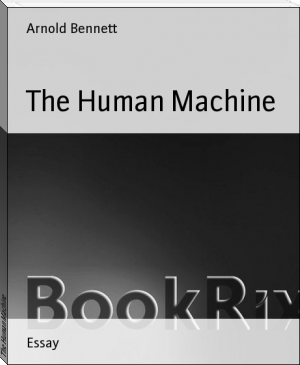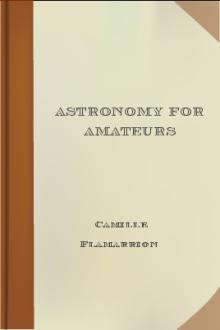The Human Machine - Arnold Bennett (sight word readers .TXT) 📗

- Author: Arnold Bennett
Book online «The Human Machine - Arnold Bennett (sight word readers .TXT) 📗». Author Arnold Bennett
The more closely we examine the development of original predispositions, the more clearly we shall see that this development is not inevitable, is not a process which works itself out independently according to mysterious, ruthless laws which we cannot understand. For instance, the effect of an original predisposition may be destroyed by an accidental shock. A young man with an inherited tendency to alcohol may develop into a stern teetotaller through the shock caused by seeing his drunken father strike his mother; whereas, if his father had chanced to be affectionate in drink, the son might have ended in the gutter. No ruthless law here! It is notorious, also, that natures are sometimes completely changed in their development by chance momentary contact with natures stronger than themselves. 'From that day I resolved--' etc. You know the phrase. Often the resolve is not kept; but often it is kept. A spark has inflamed the will. The burning will has tyrannised over the brain. New habits have been formed. And the result looks just like a miracle.
Now, if these great transformations can be brought about by accident, cannot similar transformations be brought about by a reasonable design? At any rate, if one starts to bring them about, one starts with the assurance that transformations are not impossible, since they have occurred. One starts also in the full knowledge of the influence of habit on life. Take any one of your own habits, mental or physical. You will be able to recall the time when that habit did not exist, or if it did exist it was scarcely perceptible. And you will discover that nearly all your habits have been formed unconsciously, by daily repetitions which bore no relation to a general plan, and which you practised not noticing. You will be compelled to admit that your 'character,' as it is to-day, is a structure that has been built almost without the aid of an architect; higgledy-piggledy, anyhow. But occasionally the architect did step in and design something. Here and there among your habits you will find one that you consciously and of deliberate purpose initiated and persevered with--doubtless owing to some happy influence. What is the difference between that conscious habit and the unconscious habits? None whatever as regards its effect on the sum of your character. It may be the strongest of all your habits. The only quality that differentiates it from the others is that it has a definite object (most likely a good object), and that it wholly or partially fulfils that object. There is not a man who reads these lines but has, in this detail or that, proved in himself that the will, forcing the brain to repeat the same action again and again, can modify the shape of his character as a sculptor modifies the shape of damp clay.
But if a grown man's character is developing from day to day (as it is), if nine-tenths of the development is due to unconscious action and one-tenth to conscious action, and if the one-tenth conscious is the most satisfactory part of the total result; why, in the name of common sense, henceforward, should not nine-tenths, instead of one-tenth, be due to conscious action? What is there to prevent this agreeable consummation? There is nothing whatever to prevent it--except insubordination on the part of the brain. And insubordination of the brain can be cured, as I have previously shown. When I see men unhappy and inefficient in the craft of _living_, from sheer, crass inattention to their own development; when I see misshapen men building up businesses and empires, and never stopping to build up themselves; when I see dreary men expending precisely the same energy on teaching a dog to walk on its hind-legs as would brighten the whole colour of their own lives, I feel as if I wanted to give up the ghost, so ridiculous, so fatuous does the spectacle seem! But, of course, I do not give up the ghost. The paroxysm passes. Only I really must cry out: 'Can't you see what you're missing? Can't you see that you're missing the most interesting thing on earth, far more interesting than businesses, empires, and dogs? Doesn't it strike you how clumsy and short-sighted you are--working always with an inferior machine when you might have a smooth-gliding perfection? Doesn't it strike you how badly you are treating yourself?'
Listen, you confirmed grumbler, you who make the evening meal hideous with complaints against destiny--for it is you I will single out. Are you aware what people are saying about you behind your back? They are saying that you render yourself and your family miserable by the habit which has grown on you of always grumbling. 'Surely it isn't as bad as that?' you protest. Yes, it is just as bad as that. You say: 'The fact is, I know it's absurd to grumble. But I'm like that. I've tried to stop it, and I can't!' How have you tried to stop it? 'Well, I've made up my mind several times to fight against it, but I never succeed. This is strictly between ourselves. I don't usually admit that I'm a grumbler.' Considering that you grumble for about an hour and a half every day of your life, it was sanguine, my dear sir, to expect to cure such a habit by means of a solitary intention, formed at intervals in the brain and then forgotten. No! You must do more than that. If you will daily fix your brain firmly for half an hour on the truth (you know it to be a truth) that grumbling is absurd and futile, your brain will henceforward begin to form a habit in that direction; it will begin to be moulded to the idea that grumbling is absurd and futile. In odd moments, when it isn't thinking of anything in particular, it will suddenly remember that grumbling is absurd and futile. When you sit down to the meal and open your mouth to say: 'I can't think what my ass of a partner means by--' it will remember that grumbling is absurd and futile, and will alter the arrangement of your throat, teeth, and tongue, so that you will say: 'What fine weather we're having!' In brief, it will remember involuntarily, by a new habit. All who look into their experience will admit that the failure to replace old habits by new ones is due to the fact that at the critical moment the brain does not remember; it simply forgets. The practice of concentration will cure that. All depends on regular concentration. This grumbling is an instance, though chosen not quite at hazard.
VI
LORD OVER THE NODDLE
Having proved by personal experiment the truth of the first of the two great principles which concern the human machine--namely, that the brain is a servant, not a master, and can be controlled--we may now come to the second. The second is more fundamental than the first, but it can be of no use until the first is understood and put into practice. The human machine is an apparatus of brain and muscle for enabling the Ego to develop freely in the universe by which it is surrounded, without friction. Its function is to convert the facts of the universe to the best advantage of the Ego. The facts of the universe are the material with which it is its business to deal--not the facts of an ideal universe, but the facts of this universe. Hence, when friction occurs, when the facts of the universe cease to be of advantage to the Ego, the fault is in the machine. It is not the solar system that has gone wrong, but the human machine. Second great principle, therefore: '_In case of friction, the machine is always at fault_.'
You can control nothing but your own mind. Even your two-year-old babe may defy you by the instinctive force of its personality. But your own mind you can control. Your own mind is a sacred enclosure into which nothing harmful can enter except by your permission. Your own mind has the power to transmute every external phenomenon to its own purposes. If happiness arises from cheerfulness, kindliness, and rectitude (and who will deny it?), what possible combination of circumstances is going to make you unhappy so long as the machine remains in order? If self-development consists in the utilisation of one's environment (not utilisation of somebody else's environment), how can your environment prevent you from developing? You would look rather foolish without it, anyway. In that noddle of yours is everything necessary for development, for the maintaining of dignity, for the achieving of happiness, and you are absolute lord over the noddle, will you but exercise the powers of lordship. Why worry about the contents of somebody else's noddle, in which you can be nothing but an intruder, when you may arrive at a better result, with absolute certainty, by confining your activities to your own? 'Look within.' 'The Kingdom of Heaven is within you.' 'Oh, yes!' you protest. 'All that's old. Epictetus said that. Marcus Aurelius said that. Christ said that.' They did. I admit it readily. But if you were ruffled this morning because your motor-omnibus broke down, and you had to take a cab, then so far as you are concerned these great teachers lived in vain. You, calling yourself a reasonable man, are going about dependent for your happiness, dignity, and growth, upon a thousand things over which you have no control, and the most exquisitely organised machine for ensuring happiness, dignity, and growth, is rusting away inside you. And all because you have a sort of notion that a saying said two thousand years ago cannot be practical.
You remark sagely to your child: 'No, my child, you cannot have that moon, and you will accomplish nothing by crying for it. Now, here is this beautiful box of bricks, by means of which you may amuse yourself while learning many wonderful matters and improving your mind. You must try to be content with what you have, and to make the best of it. If you had the moon you wouldn't be any happier.' Then you lie awake half the night repining because the last post has brought a letter to the effect that 'the Board cannot entertain your application for,' etc. You say the two cases are not alike. They are not. Your child has never heard of Epictetus. On the other hand, justice _is_ the moon. At your age you surely know that. 'But the Directors _ought_ to have granted my application,' you insist. Exactly! I agree. But we are not in a universe of _oughts_. You have a special apparatus within you for dealing with a universe where _oughts_ are flagrantly disregarded. And you are not using it. You are lying awake, keeping your wife awake, injuring your health, injuring hers, losing your dignity and your cheerfulness. Why? Because you think that these antics and performances will influence the Board? Because you think that they will put you into a better condition for dealing with your environment to-morrow? Not a bit. Simply because the machine is at fault.
In certain cases we do make use of our machines (as well as their sad condition of neglect will allow), but in





Comments (0)